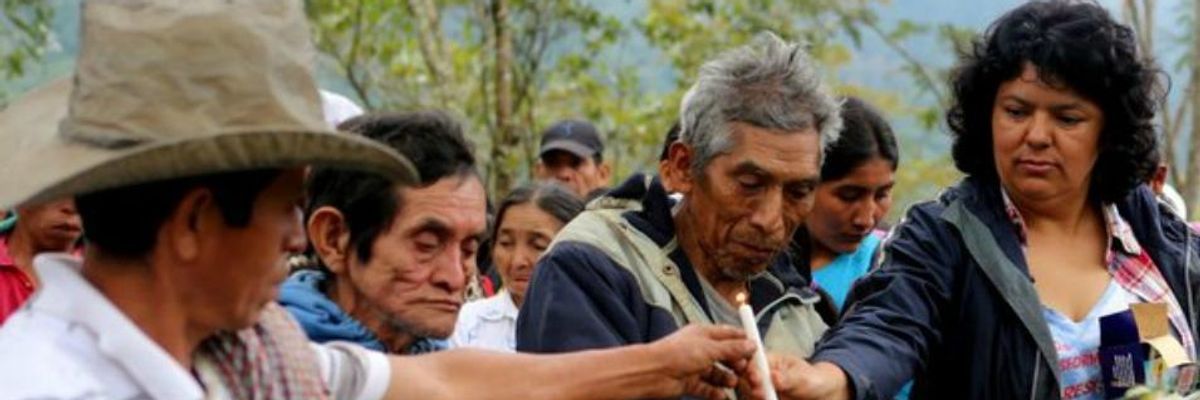"How many more people will die before the world takes notice?"
That's a question posed by the organization Global Witness, whose new report, How Many More?, exposes what it calls a "hidden crisis" of murders of those who defend the earth from environmental destruction.
The "overarching theme" of the killings last year, which averaged more than two a week, involved disputes over control and use of land, but they also included incidents involving pollution, wildlife conservation, and illegal fishing. This year's report also found a spike in the deaths of those protesting hydroelectric dams.
The organization, which campaigns for transparency of global resource extraction, states that in 2014, 116 environmental and land defenders were killed--40 percent of whom were Indigenous. The report states that lack of accessible information makes that a likely conservative figure.
As one member of the Panama community from the Bajo Aguan valley in Honduras states, according to the report: "Here the police, the military, prosecutors, judges, all of them are ready to defend the owners of the big farms, while we are the ones who are dying."
"Environmental defenders are fighting to protect our climate against ever-increasing odds."
--Billy Kyte, Global WitnessThe report reflects the continuation of a deadly trend, as last year's figures reflect a 20 percent increase from those documented in 2013.
The report documents killings in 17 countries, though roughly three-quarters of them took place in Central and South America. The country with highest number of killings was Brazil with 29, followed by Colombia with 25, and the Philippines with 15.
Honduras has the dubious distinction of being the country with the most such killings per capita. The Central American county is home to one of the 2015 Goldman Environmental Prize winners, Berta Caceres, who's been involved in a years-long campaign to stop a dam that threatens to displace her Indigenous community off their ancestral land. "They follow me. They threaten to kill me, to kidnap me, they threaten my family. That is what we face," Caceres is quoted as saying in the report.
Among the deadly incidents noted in report:
On 24 October 2014, Henry Alameda, an indigenous Lumad leader from the Southern Philippines, was dragged from his house, taken to a forested area and shot dead by a paramilitary group. Alameda was an active council member of MAPASU, an organization strongly protesting against mining operations and plantations in Caraga region."
Global Witness emphasizes the challenges of finding the perpetrators of these crimes, though in some cases it has been able to point to paramilitary groups or private security guards. Yet, the report states, "The true authors of these crimes--a powerful nexus of corporate and state interests--are escaping unpunished."
Unless real action is taken to protect these often invisible eco-defenders, agreements at the UN climate talks (COP21) taking place in Paris later this year "will ultimately ring hollow," Global Witness declares.
It's time, the report states, for governments to take action--and for civil society to exert pressure on governments to protect these land defenders.
"Environmental defenders are fighting to protect our climate against ever-increasing odds," Billy Kyte, a campaigner at Global Witness, said in a media statement.
"Now more than ever we need to start holding governments and companies to account for the rising death toll on our environmental frontiers," Kyte continued. "The secrecy around how natural resource deals are made fuels violence and must end. It's time for the international community to stand up and take notice."
The report adds: "The world is standing idle whilst people on the frontline of the struggle to protect the environment are getting killed. The time for action on these killings is now."
